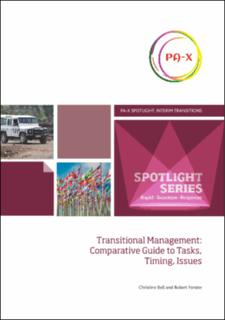Transitional Management: Comparative Guide to Tasks, Timing, Issues
Research report
Permanent lenke
https://hdl.handle.net/11250/2756938Utgivelsesdato
2021-05-01Metadata
Vis full innførselSamlinger
- Publications [1498]
Originalversjon
Edinburgh: Global Justice Academic, University of Edinburgh (PA-X Spotlight Series: Interim Transitions)Sammendrag
This report brings together the Political Settlements Research Programme’s comparative research on transitional government and accompanying processes into a ‘Quick Guide’ on the management of negotiated transitional arrangements as a mechanism for moving from conflict or social crisis to peace. The Guide aims to set out the basic modalities and processes involved in ‘transition management’, and some of the dilemmas raised. In this Guide, we address three key questions (although not in this order): 1. What elements matter most, over what timeframes and in what circumstances, if negotiated transitions are to avoid serious violence, open up inclusive political settlements, and start building long-term stability? 2. What does the evidence tell us about the main risks, trade-offs and factors that determine success or failure of political and war-to-peace transitions? 3. How does question 2 play out with regard to: military/security sector; ruling and opposition parties; non-state actors (including armed groups, churches, civil society); elections; international actors (bilateral, multilateral, regional).
